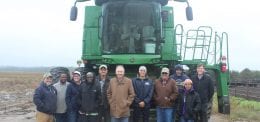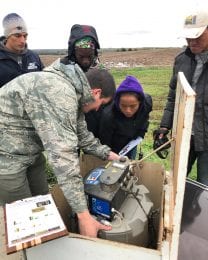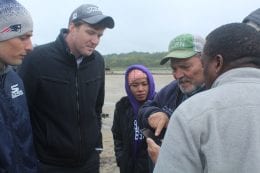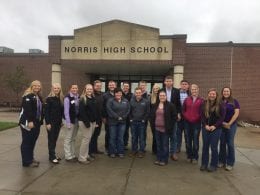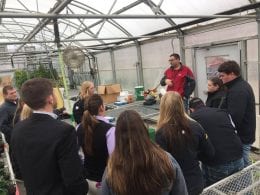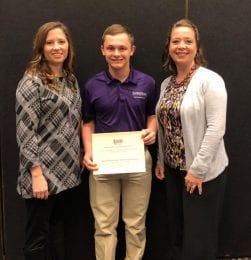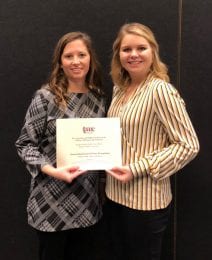By Linda Gilmore, Editor, Publishing Unit
 Gaea Hock is part of an interdisciplinary team awarded a National Science Foundation grant to train graduate students to help communities address complex issues of water management and rural vitality. Melanie Derby, K-State assistant professor of mechanical and nuclear engineering and Hal and Mary Siegele Professor of Engineering, leads the team. Derby will help meet these challenges by training students to work at the nexus of several disciplines.
Gaea Hock is part of an interdisciplinary team awarded a National Science Foundation grant to train graduate students to help communities address complex issues of water management and rural vitality. Melanie Derby, K-State assistant professor of mechanical and nuclear engineering and Hal and Mary Siegele Professor of Engineering, leads the team. Derby will help meet these challenges by training students to work at the nexus of several disciplines.
“The whole goal of interdisciplinary research is that someone else’s perspective makes both your work stronger,” Derby said. “We do fundamental engineering work, but we want it to go to the field. We need to know how to make that happen. One of our goals is to help western Kansas and other semiarid communities be resilient in the future. We need all the components — engineering, agricultural economics, sociology, and more — to solve these important challenges.”
Derby and her colleagues will mentor graduate students as they conduct fundamental research in three areas of the crucial food-energy-water system: conservation of and producer relationships with the Ogallala Aquifer, soil-water-microbial systems, and technologies to transform animal waste into energy and water. They also will work to understand engineering, economic, and sociocultural barriers to implementing emerging innovations.
Building communication skills and a common vocabulary across disciplines is a crucial aspect of the training. Students will engage with policymakers and attend state legislative sessions in Topeka, plus they will spend time at the Southwest Research-Extension Center in Garden City to research smart water technologies and meet with farmers and others whose livelihoods depend on conserving the aquifer and other resources.
In addition to Derby and Matt Sanderson (co-principal investigator and the Randall C. Hill Distinguished Professor of Sociology), the team includes co-investigators Jonathan Aguilar and Stacy Hutchinson, biological and agricultural engineering; Prathap Parameswaran, civil engineering; and David Steward, civil and environmental engineering department, North Dakota State University; educational lead Gaea Hock ’03, ’06, communications and agricultural education; and advisors Nathan Hendricks, agricultural economics, and Ryan Hansen, chemical engineering. The program will train 50 master’s and doctoral students, including 25 funded trainees from the colleges of Agriculture, Arts and Sciences, and Engineering.
